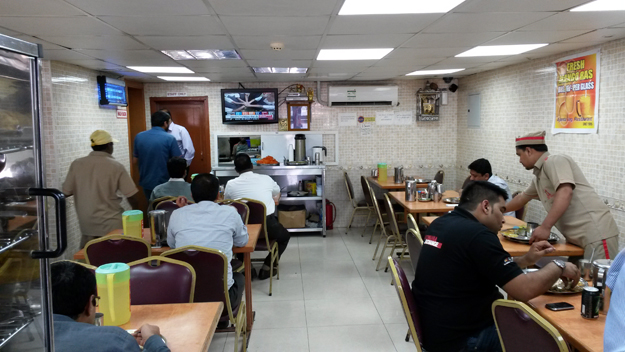“Take what you want. Eat what you take.”
This paper sign stuck on one of the walls of the restaurant adds a no-nonsense touch to this eating joint, much like the “Good to see, nice to hold, once broken, considered sold” signs you may see next to decoration items in gift shops. Subtle, yet effective.
Ajanta, a Gujarati restaurant located in the bustling Karama, fades in comparison to the tony restaurants that dot Dubai, and can easily be mistaken for an unkempt, roadside savoury shop. Yet, come lunchtime and the place is buzzing with office crowd from all over Dubai, often seen waiting in queues, and they come for only one thing – the unlimited thali.
For Dh15, one can have as many portions of dal, three types of subzis, buttermilk, chapati and rice, topped off with a jalebi. The catch – don’t waste food, or you pay Dh13 extra.
“We serve 150-200 thalis per day. Most customers are regulars, and come up to three times a week,” says 45-year-old Jatish Shah, who runs the place along with his brother.
‘The concept is simple. You should not have to struggle to eat. You should not have to pay through your nose. At the same time, you have to respect food. Therefore, the food is cheap, but at the same time you are encouraged not to waste food,” he says, pointing to the famous notice stuck below the air conditioner
The 30-year-old eating joint earns Dh20-25 per customer per day, if you include sweets, lassi, extra papad or any other vegetable curry cooked on order.
How It Started!
‘The concept is not new, but it is rare in this part of the world. People here are used to eating at lavish restaurants, but they complain that it’s expensive. Moreover, for the large number of bachelors here who usually don’t cook, spending Dh50-70 each day on food is not affordable. Plus the oil and spices are heavy on the stomach. So this concept was waiting to happen,’ Shah explains.
‘Initially people were apprehensive. But our food tastes home-cooked, uses less oil and simple spices, therefore it soon became a favourite spot for the homesick bachelors missing home-cooked food.’
The Economics
Such a business model, whether in food or any other industry, runs on volume production, and cannot be sustained if consumption dips below a certain level. In Ajanta’s case, the magic number is 100 thalis per day.
“There are days when we sell 40-50 thalis per day, especially on festivals when offices are closed. We make losses that day, though it is recovered by other sales the restaurant makes,” adds Shah.
The Business
To put things into perspective, the unlimited thali business forms only 30 per cent of the restaurant’s overall sales, with the rest coming from the regular menu, along with breakfast and evening snacks. The restaurant also provides catering services to two nearby offices.
The eatery has two sister outlets in Bur Dubai and Deira which cater to labourers, and each one easily sells 150 thalis a day, according to Shah.
Apart from this, Ajanta also supplies snacks like samosas, jalebis, dhoklas and khandvis to nearby restaurants.
“Very often we get phone calls from restaurants who have run out of their own stock, or who simply don’t make these snacks but have them on their menus. It all adds to the kitty,” says Shah proudly.
The Customers
“The average is four chapatis per thali,” Shah says. “Sometimes people have up to eight chapatis and three helpings of rice,” he adds with a grin, gesturing at a portly gentleman entering the restaurant. “At times I get 25-30 such customers on a single day,” he says, refusing to reveal the dent this adds to the cash register.
However, there are also days of recovery. “Families with children are good for business. Kids tend to waste food. Not everything can be polished off by their parents.” Such customers usually come during weekends, and the restaurant easily makes extra money on 10-15 thalis.
The Penalty
“People appreciate the extra charges on wasted food,” says Shah. “The waiters do a quick check of the table before getting the bill. Often, the glance alone is adequate warning and the rest of the food is consumed before the bill arrives.”
“No one likes to pay extra, you see.”
(Note: Here “Dh” & “AED” represents the currency of U.A.E i.e. Dirham.)
Crafted with brevity
to make certain you see what others don't
Subscribe. We are growing.














He is a journalist who loves reading, number-crunching and driving for miles and miles in his free time. A big fan of psychedelic rock. Loves to eat and is open to experimenting with cuisines. Aspires to be like one of his short-story heroes: Anton Chekhov, O. Henry and Mark Twain.